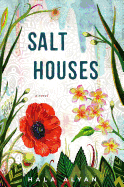
Hala Alyan's first novel follows the lives of one Palestinian family through the last half of the 20th century into the 21st. Although the history of the Middle East is filled with fraught moments during this time, Salt Houses focuses on what happens before, and after, those moments. Alyan, a poet who also works as a psychologist, is more interested in how people choose to, or choose not to, move on from moments of trauma and upheaval.
The book begins in 1963 with the wedding of headstrong Alia and taciturn Atef, a simple middle-class marriage in the Palestinian town of Nablus. Alia's mother, Salma, reads her daughter's tea leaves, and, in an act of motherly protection, lies about what she has seen. Her silence, while noble, does little to protect Alia from the traumas to come. Soon, she and Atef must flee Palestine for Kuwait, raising their family in a foreign world that shatters once the Gulf War begins. Their three children flee in turn--one, Riham, into a marriage to a much older man and a life of faith; the other two, daughter Souad and son Karam, to the West.
Merely by being a novel about Palestinians, Salt Houses will be considered a political work. That's unfair, given that Alyan very purposefully eschews any political position (in fact, the book seems to suggest any political stance is ultimately rendered untenable by the flow of time). The history of the Palestinian people drives the narrative, but Salt Houses treats it as ancillary, a way to present decisions that can be probed to explore deeper questions about family, love and overcoming trauma. --Noah Cruickshank

